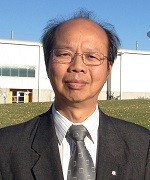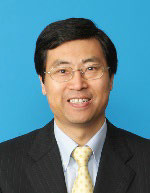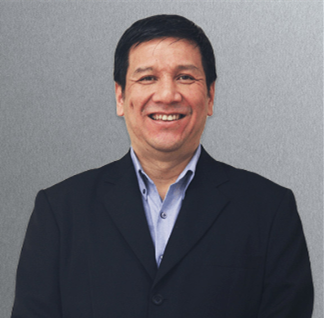ICMSC Former Speakers

Prof. John Mo
(Fellow of IME and IEA)
Royal Melbourne Institute of Technology, Australia
John P. T. Mo is Professor of
Manufacturing Engineering and former Head of Manufacturing and
Materials Engineering at RMIT University, Australia, since 2007. He
has been an active researcher in manufacturing and complex systems
for over 35 years and worked for educational and scientific
institutions in Hong Kong and Australia. From 1996, John was a
Project Manager and Research Team Leader with Australia's
Commonwealth Scientific and Industrial Research Organisation (CSIRO)
for 11 years leading a team of 15 research scientists. John has a
broad research interest and has received numerous industrial
research grants. A few highlights of the projects include: signal
diagnostics for plasma cutting machines, ANZAC ship alliance
engineering analysis, optimisation of titanium machining for
aerospace industry, critical infrastructure protection modelling and
analysis, polycrystalline diamond cutting tools on multi-axes CNC
machine, system analysis for support of complex engineering systems
John obtained his doctorate from Loughborough University, UK and is
a Fellow of Institution of Mechanical Engineers (UK) and Institution
of Engineers Australia.
Speech Title: Build Inherent Reliability into Products with System Health Prediction
Abstract: With the increasing computational and
communication capabilities of embedded systems, modern engineering
products systems have become more autonomous and sophisticated.
Research into methods to ensure continuous operation of machines
have been continuing for decades, mostly focusing on detecting
system failure when it happens. However, when a system failure is
detected, it is already too late. At least one faulty outcome has
been produced, plus further actions are required to stop the system
as soon as possible for breakdown maintenance. This means loss of
materials, resources and time. Therefore, research in system
reliability should be extended to predicting faults in advance so
that the system can be adjusted ahead of time to prevent failures as
well as allowing time to execute an emergency plan to minimise
disruption to operations of the system. This paper reviews research
in system prognostic based on system signal analysis, starting from
very early stage of simple on off timing control, to the latest
fault monitoring and prediction methodologies. The advantages and
disadvantages of different signal processing and feature recognition
schemes are explained and evaluated. With more online data available
under the banner of Industry 4.0, such new system condition
indicators based on statistical analysis of frequency spectrum can
be continuously updated providing more reliable and faster responses
to the extent that prediction of future failures can be computed at
reasonable time ahead of the occurrence event. By predicting and
executing a fault remedial action, the impact or consequence of the
fault can be reduced.

Prof. Ninshu Ma
Osaka University, Japan
Professor Ninshu MA received his doctoral degree in Engineering from Osaka University in 1994 and went on to work for 21 years as a professional consultant in the field of computer-aided engineering at Japan Research Institute (JRI). Now, he is working as a professor at JWRI. Therefore, he has a comprehensive viewpoint in both industry and academic fields. Furthermore, he is a leader of the Global and Industrial Collaborative Research Center for Computational Welding Science (CCWS) to establish a framework of the computational welding science with the rapid progress in computer technology to meet various demands from the industry. He has more than 300 international papers related to computational welding science.

Prof. Shyh-Chour Huang
National Kaohsiung University of Science and Technology, Taiwan
Shyh-Chour Huang received his bachelor’s degree in Aeronautics and Astronautics Engineering from the National Cheng-Kung University in 1980, Taiwan, ROC. He received the M.S. and Ph.D. degree in Mechanical Engineering from the University of Cincinnati, USA, in 1987 and 1990, respectively. He is a distinguished professor with the Mechanical Engineering at the National Kaohsiung University of Science and Technology, Taiwan, ROC. Dr. Huang is a Fellow of IET and Senior Member of IEEE. His research interests include biomechanics, compliant mechanisms, metamaterials, multibody dynamics, vibration control, and optimization design.

Assoc. Prof. Ratchatin Chancharoen
Chulalongkorn University, Thailand
Dr. Ratchatin Chancharoen is currently an Associate Professor at the Mechanical Engineering Department, Chulalongkorn University, Thailand. He received his BS degree in mechanical engineering from Chulalongkorn University in 1991, MS degree in mechanical engineering from Oregon State University in 1994, and PhD degree in mechanical engineering from Chulalongkorn University in 2000. Dr. Ratchatin Chancharoen has twenty years experience in robotics research including both manipulators and mobile robots and ten years in teaching both Robotics and Mechatronics at the university level. During these years, he has designed and built more than twenty robots in various configurations and published more than 20 research papers and one text book entitled “Linear Control Systems” (in Thai). He is principal investigator and co-investigator of a number of research grants in robotics and also the manager of a number of industrial projects in design and control. His major research activities involve tele-operation and control of robotics manipulators and mobile robots using various kinds of sensors, especially force and vision. His current research is the design a telerobot, a new type of robot, to work closely with human to do a higher level of tasks. The telerobot is designed with lighter frame, less power consumption, small footprint controller, and higher level of intelligence, compared to the industrial robot, to safely work in our working space. This type of robot will be populated in the near future as more complex tasks are demanded. His main research interests are in the field of Robotics and Mechatronics including new parallel robot configuration, new hardware processor, electronics, control algorithm, and intelligence.
